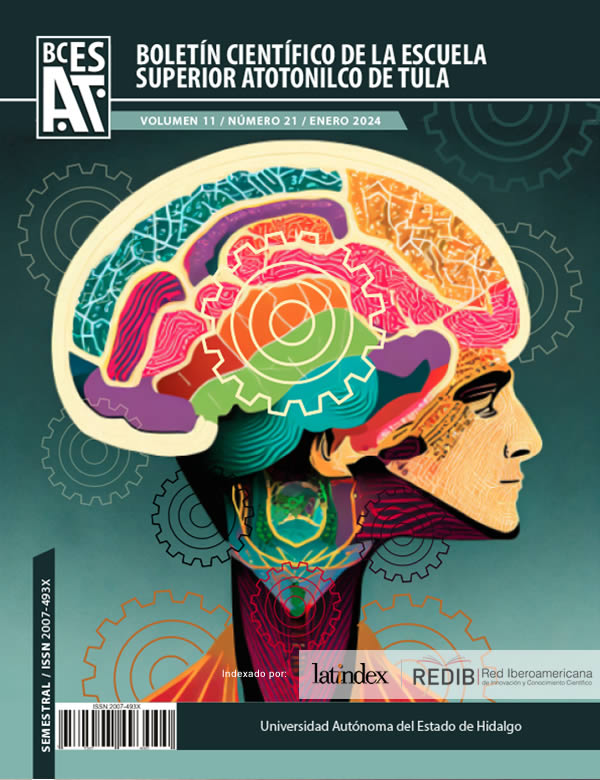Intellectual quotient and school performance in basic education
Abstract
he aim of the study was to determine the relationship between the Intelligence Quotient (IQ) measured through the Wechsler Intelligence Scale for Children (WISC-IV) and school performance, expressed through the final grades of the current year. We conducted a quantitative and cross-sectional study, with a sample of 32 students who finished the 5th. elementary grade of a public school in the municipality of San Juan del Río, Queretaro. It was found that the school performance measured through the general average was 8.72, including the subjects of Spanish, Mathematics, Natural Sciences, Geography, History, Civic and Ethical Education, Physical Education and Artistic Education. On the other hand, the IQ results were 91.9. To analyze the results, the Pearson correlation coefficient was used at a significance of (r=0.05). The resulting correlation was (R=0.66). For its part, the Verbal Comprehension Index (ICV) was the one that presented the highest correlation with different subjects, (Spanish (r = .73), Mathematics (r = .62) and Civic and Ethical Training (r = .68)). While the Processing Speed Index (IVP) and the Working Memory Index (IMT) do not present correlations with any subject or with the general final average. Which means that IQ is a good predictor of school performance, but in turn, if students obtain higher levels of achievement in school performance, this will also be reflected in their IQ; highlighting the incidence of Verbal Comprehension as the main predictor of school performance.
Downloads
References
Caballero, C., Abello, R. & Palacio, J. (2007). Relación de burnout y rendimiento académico con la satisfacción frente a los estudios en estudiantes universitarios. Avances en Psicología Latinoamericana, 25(2), 98-111. Recuperado de http://www.scielo.org.co/pdf/apl/v25n2/v25n2a7.pdf
Caipa R. J. (2017) Estudio correlacional entre la capacidad intellectual global y la velocidad de procesamiento en el rendimiento academico. [Tésis de licenciatura inedita] Corporación Universitaria Iberoamericana Facultad De Educación, Ciencias Humanas y Sociales, Programa De Psicología Bogotá D.C. http://repositorio.iberoamericana.edu.co/bitstream/001/507/1/Estudio%20cor relacional%20entre%20la%20capacidad%20intelectual%20global%20y%20l a%20velocidad%20de%20procesamiento%20con%20el%20rendimiento%2 0acad%C3%A9mico.pdf.
Hernández-Sampieri, R., Fernández-Collado, C. y Baptista-Lucio, P. (2014). Definición del alcance de la investigación que se realizará: exploratorio, descriptivo, correlacional o explicativo. En Metodología de la Investigación (6ª ed., pp. 88-101). México: McGraw-Hill.
INEE (2018) Planea. Resultados nacionales. https://historico.mejoredu.gob.mx/evaluaciones/planea/resultados-planea/
Lamas H.A. (2015) Sobre el rendimiento escolar. Propósitos y representaciónes, 3(1), 313-386. Recuperado de http://dx.doi.org/10.20511/pyr2015.v3n1.74.
Llagan A. E. y Mosocos V. (2018) Coeficiente intelectual y el rendimiento académico en los estudiantes de la unidad educativa “Fernando Daquilema” Riobamba octubre 2017 – marzo 2018. [Tésis de licenciatura inedita] Universidad Nacional De Chimborazo. http://dspace.unach.edu.ec/bitstream/51000/4886/1/UNACH- FCEHT-TG-P.EDUC-2018-000037.pdf.
Martínez, Mera S.E. (2018) RAZONAMIENTO LÓGICO VERBAL EN EL RENDIMIENTO ACADÉMICO. GUÍA DIDÁCTICA. [Tesis de Licenciatura, Universidad de Guayaquil] Repositorio institucional de la Universidad Guayaquil. http://repositorio.ug.edu.ec/handle/redug/35378
Martínez-Otero, P. V. (2007). Los adolescentes ante el estudio. Causas y consecuencias del rendimiento académico. Madrid: Fundamentos.
Méndez-Ramírez, O. (2011) CALIDAD DE LA EDUCACIÓN Y RENDIMIENTO ESCOLAR EN ESTUDIANTES DE SEXTO GRADO DE MONTERREY, MÉXICO Iberóforum. Revista de Ciencias Sociales de la Universidad Iberoamericana, 6(12), 52-78. Recuperado de https://www.redalyc.org/pdf/2110/211022082009.pdf
INEE (2006) Sitio oficial del Instituto Nacional para la Evaluación de la Educación. http://www.inee.edu.mx/ México.
OECD (2019) México- Nota País- Resultados PISA 2018, (Volúmenes I-III). Paris: OECD Publishing, https://www.oecd.org/pisa/publications/PISA2018_CN_MEX_Spanish.pdf
Páez M.J. y Pérez N.G. (2007) Rendimiento escolar, adaptación social en niños con alto coeficiente intelectual México, [Tesis de licenciatura, inédita]. Universidad Pedagógica Nacional Unidad Ajusco. http://200.23.113.51/pdf/24344.pdf.
REAL ACADEMIA ESPAÑOLA: Diccionario de la lengua española, 23.ª ed., [versión 23.5 en línea]. <https://dle.rae.es> [10 de marzo de 2020].
Sánchez, M.L. (2018) LA IMPORTANCIA DEL RAZONAMIENTO VERBAL EN LA EDUCACIÓN MEDIA SUPERIOR. [Tesis de licenciatura, inédita]. Benemérita Universidad Autónoma De Puebla. https://repositorioinstitucional.buap.mx/bitstream/handle/20.500.12371/8567/695518T.pdf?sequence=1
Stolk, G., Urdaneta, I. (2018) Relación del rendimiento académico con inteligencia, funciones ejecutivas y personalidad en niños superdotados, con altas capacidades y talentosos. [Tesis de licenciatura, inédita] Universidad Metropolitana, Facultad De Ciencias y Artes, Departamento de Ciencias del Comportamiento, Escuela de Psicología.
OEI (2005), Sitio de la Organización de Estados Iberoamericanos [En línea]. http://www.oei.es/cie.htm (recuperado el 10 de febrero del 2020).
Vásquez Vásquez, G. A., & Pérez Azahuanche, M. A. (2020). Estrategias lúdicas para la comprensión de textos en estudiantes de educación primaria. IE Revista De Investigación Educativa De La REDIECH, 11, e805. https://doi.org/10.33010/ie_rie_rediech.v11i0.805
Wechler, D. (2005) Wisc-IV Escala de Inteligencia de Wehler para niños -IV. Madrid: Departamento I+D. TEA Ediciónes, S.A.
Willcox, M. del R. (2011). Factores de riesgo y protección para el rendimiento académico: Un estudio descriptivo en estudiantes de Psicología de una universidad privada. Revista Iberoamericana de Educación, 55(1), 1-9. Recuperado de http://www.rieoei.org/deloslectores/3878Wilcox.pdf
Copyright (c) 2023 Julio César Zamudio, Jesús Adriana Sánchez Martínez, Sandra Cecilia Martínez Medina

This work is licensed under a Creative Commons Attribution-NonCommercial-NoDerivatives 4.0 International License.










